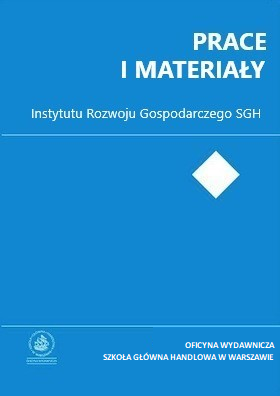Bank credit and political business cycle
Main Article Content
Abstract
Except the instruments of fiscal and monetary policy the economic literature rarely draws attention to other tools that can serve a political creation of the business cycle. However, it seems that the methods of inducing such phenomenon can be more. The study contains the overview of the latest studies to determine whether this group includes banks as well. The analysis points to the risk that the credit policy conducted by politically manipulated banks may allow to achieve similar effects, as previously known instruments of the cycle creation. Such a mechanism is however more difficult to detect. From the politicians' point of view therefore it may be more profitable. Empirical studies show that greater risk refers to state-owned banks rather to private banks. The study shows that Central and Eastern Europe, including Poland may be exposed to the occurrence of political business cycle caused by stimulated by politicians credit supply.(original abstract)
Article Details
References
Akerman J., Political Economic Cycles, Kyklos, 1947, no. I.
Alesina A., Comments and Discussion on Nordhaus’s Alternative Approches to the Political Business Cycle, “Brookings Papers on Economic Activity”1989, no. 2.
Alesina A., Macroeconomic Policy in a Two Party System as a Repeated Game, “Quarterly Journal of Economics”, August 1987.
Bertay A. C., A. Demigruc-Kunt, H. Huizinga, Bank ownership and credit over the business cycle: Is lending by state banks less procyclical?, “Policy Research Working Paper” no. 6110, The World Bank 2012.
Baum C. F., M. Caglayan, O. Talavera, Parlamentary Election Cycles and the Turkish Banking Sector, “Turkish Economic Association, Discussion Paper” 2009, no. 5.
Brender A., A. Drazen, Political Budget Cycles in New versus Established Democracies, “NBER Working Paper” 2004, no. 10539.
Breusch T.S., A.R. Pagan, Simple test For Heteroscedasticity And Random Coeficient Variation, “Econometrica” 1979, vol. 47.
Broz L., Partisan Financial Cycles. In Politics In The New Hard Times: The Great Recession In Comparative Perspective by M. Kahler, D.A. Lake, 2013.
Claessens S., E. Feijen, L. Laeven, Political Connections And Preferencial Access To Finance: The Role Of Campaign Contributions, “Journal of Financial Economics” 2008, no. 88.
Cole S., Fixing Market Failures or Fixing Elections? Agricalture Credit In India, “American Economic Journal: Applied Economics” 2009.
Cukierman G., A. Meltzer, A Positive Theory of Discretionary Policy, the Cost of Democratic Government and the Benefits of a Constitution, Economic Inquiry, 24, 1986.
Dinc S. I., Politicians And Banks: Political Influences On Government-owned Banks In Emerging Markets, “Journal of Financial Economics” 2005, no. 77.
Gonzales-Garcia J., F. Grigoli, State-Owned Banks and Fiscal Discipline, “IMF Working Paper” 2013, no. WP/13/206.
Hausman J.A., Specification Tests In Econometrics, “Econometrica”, 1978, vol. 46.
Hibbs D.A., Political Parties and Macroeconomic Policy, “The American Political Science Review” 1977, vol. 71.
Jackowicz K., O. Kowalewski, Ł. Kozłowski, Stopa dochodu odsetkowego banków a cykl wyborczy, MBA CE, 2012, nr 6.
Jula D., Economic Impact of Political Cycles – The Relevance of European Experiences for Romania, Research Centre on Transition Economics, Universite Pantheon- Sorbonne, Paris 2001.
Kalecki M., Polityczne aspekty pełnego zatrudnienia, 1943, w: Dzieła t. 1, PWE, Warszawa 1979.
Kern A., P.D. Amri, Political Credit Cycles – Myth or Reality?, Working Paper prepared for the 2014 Conference of the International Political Economy Society at Georgetown University.
Khwaja A.I., A. Mian, Do Lenders Favor Politically Connected Firms? Rent Provision In An Emerging Financial Market, “The Quarterly Journal of Economics”, 2005.
La Porta R., F. Lopez-De-Silanes, A. Shleifer, Government Ownership of Banks, “The Journal of Finance” February 2002, vol. 57, Issue 1.
Lavezzolo S., Political Lending Cycles In Spanish Cajas, EPSA 2013.
Micco A., U. Panizza, M. Yanez, Bank Ownership And Performance Does Politics Matter?, Central Bank of Chile, “Working Paper” 2005, no. 356.
Nordhaus W.D., The Political Business Cycle, “Review of Economic Studies” 1975, no. 42. Persson T., G. Tabbelini, Macroeconomic Policy, Credibility and Politics, Harwood Academy, London 1990.
Rogoff K., A. Sibert, Elections and Macroeconomic Policy Cycles, “Review of Economic Studies”, 1988, no. 55.
Rogoff K., Equilibrium Political Budget Cycles, “American Economic Review” 1990, no 80.
Santiso J., Banking on Democracy: Financial Markets and Elections in Emerging Countries, MIT Press, 2013.
